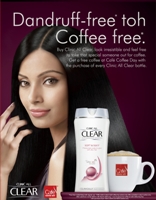 Sitting in his corner office at Hindustan Unilever's spanking new headquarters in Mumbai, Nitin Paranjpe often walks up to his sales director to ask him the following questions : Why has the company's product movement slowed down in Asansol in the past couple of days? Or, why aren't there enough stocks in the FMCG major's Coimbatore depot?
Sitting in his corner office at Hindustan Unilever's spanking new headquarters in Mumbai, Nitin Paranjpe often walks up to his sales director to ask him the following questions : Why has the company's product movement slowed down in Asansol in the past couple of days? Or, why aren't there enough stocks in the FMCG major's Coimbatore depot?
The questions are hypothetical, but show how the fast moving consumer goods major is using technology for market development. HUL chairman and president of Unilever Asia, Africa Harish Manwani says, "It's no longer enough just to deliver the products, it's now more important to compete for non-users of branded FMCG products".
HUL has gone into strategic partnerships with technology companies for such targeted market development. For example, the company's sales persons will have in their hand-held devices all details of kirana stores in the areas they operate in.
Initiatives like this have given vital marketing lessons in consumer insights. For example, the company found that the Annapurna atta sells more in the south than north. Surveys found that unlike the practice in the north, people in the south eat rotis only occassionally and prefer atta in packaged forms.
Manwani says these little things have helped HUL achieve a double-digit volume growth in the first quarter of this year. That's a sharp rebound considering that the company's performance had slipped in fiscal 2010.
"While everyone was going into stores, we went into consumers' homes to find out what she wants. This is a part of the 4M of marketing ? market development, market share, margins and mood of the consumers", Manwani says.
The other part of course was constant innovation to build markets. One of the reasons why margins rose sharply during the first quarter was better product mix due to new launches. In the last one year alone, HUL had 30 product launches.
HUL believes there is a huge market development opportunity in countries like India as consumption is still one-third that in Indonesia and one-seventh that in China.
He gives the example of Dove shampoo to show how market development initiatives have worked for the company.
From zero, the company now has over 7 per cent of market share and leads in modern trade. Soupy snacks are a differentiated offering, so is Brooke Bond Sehatmand tea, demonstrating HUL's fundamental business model of straddling the pyramid.
HUL has codified how it can go about doing market development and cater to a large number of heterogeneous consumers. In the laundry market, for example, the company has Wheel at the mass end, Rin the middle and Surf at the top end.
Manwani says for a company like HUL which has built brands and positions, the challenge is how do you get people to use more, buy more, pay more, which is uptrade.
Take the example of Ponds. It was earlier known only as a cold cream, but now it has seen significant uptrade.
In the premium range, you have Ponds age miracle and other skin care products.
The same game is now being played in the hair conditioning segment, which has the potential to grow as big as shampoo.
HUL is confident of trebling its rural reach in two years ? an audacious plan considering that the company wants to create in two years what it created in the last 25 years.
But Manwani is confident of achieving that due to the company re-emerging as thought leaders in the market place.
It has launched initiatives like 'go to market' and 'Bushfire' so that the company can ensure reaching its products to seven million outlets instead of selling the product in just 2,000 modern trade stores. There is a different level of challenge here," he says.
Manwani says another important lesson (the fourth' M') the company has learnt is understanding the mood of the local consumers.
"Our formula is think global, act local, as blindly transporting products without local understanding makes no sense.
"If you are in India, think obsessively about Indian consumers, but act global. So find out the needs of your Indian consumer and then use global scale to provide the best solution globally for the Indian consumer," he says.
Knorr is a perfect example of this. From just soup, it has not only moved to soupy noodles (soups and snacks), which is a runaway success, but is now positioned as a complete cooking aid (meal maker) for Indian housewives.






